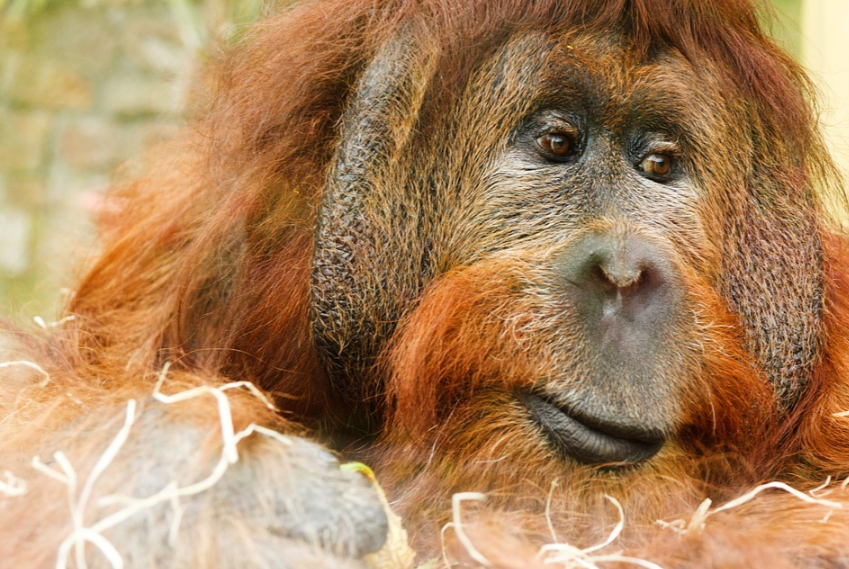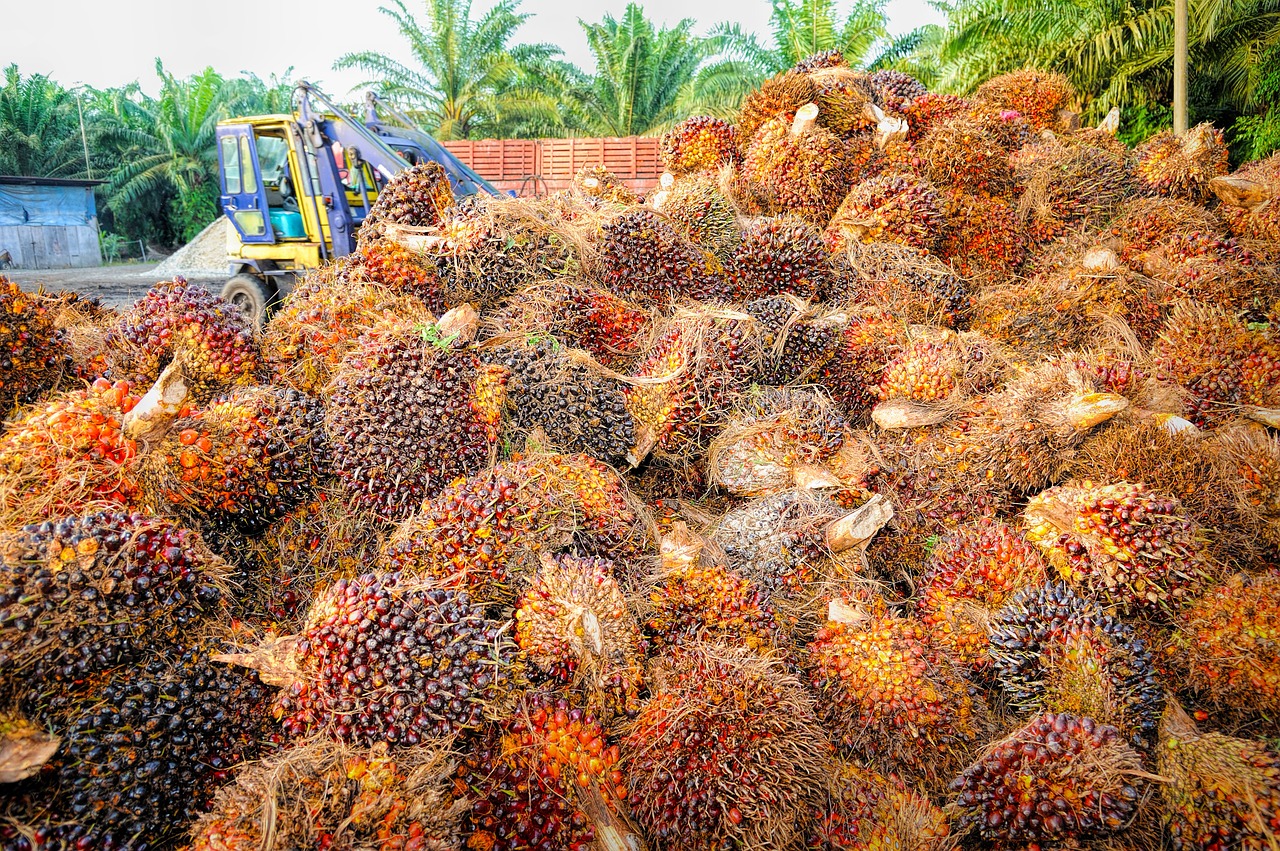Valentine’s Day is a holiday about love, but our consumer V-Day habits are breaking our hearts. In 2018, consumers will spend nearly $19.6 billion on Valentine’s Day, with 55% of those purchases being candy. Of all the items one might associate with Valentine’s Day, chocolate is certainly among the most commonly pictured and purchased. Unfortunately, this decadent and beloved confection is one of the most common products to contain palm oil. Life is indeed like a box of chocolates, and it’s overflowing with the stuff, which is terrible news for the rainforest and species across the globe. To protect great apes, our forests and our planet, we need to act now.
What’s at the Heart of This Palm Oil Issue?
In 2017, visiting JGI Australia and New Zealand, Dr. Goodall spoke about the urgency to stop deforestation, especially in Indonesia, where palm oil is the main product and orangutans are endangered. Palm oil production has been an ongoing source for concern because of its detrimental effect on forests and great ape habitat. Palm oil began as a subsistence crop in Africa in the 1960’s, then spread to Southeast Asia and became a major industrial agriculture product in Indonesia and Malaysia. Palm oil is one of the fastest growing crops in the world and its production has huge negative impact on great apes (UNEP). From the estimated 27 million tons of palm oil produced in 2013, Indonesia aims to increase palm oil production to 40 million tons by 2020.
 Much of this palm oil ends up in your chocolate and candy. Of the 1,700 members of the Roundtable on Sustainable Palm Oil (RSPO), the big four global candy companies, Nestle, Mars, Ferrero and Mondelez have in some way committed to source certified sustainable palm oil (CSPO). This is good news, but this certification should be considered within the landscape of many complicated factors, “RSPO certification isn’t at present a guarantee that the palm oil used…is deforestation free,” Pat Venditti, Greenpeace International. According to a recent report, only 21% of palm oil produced globally is certified by RSPO. This means that a majority of palm oil is still produced using the slash and burn method, which releases carbon into the atmosphere, accelerating the effects of climate change and destroying forests and peatlands, which are the main habitats of many great ape and other species.
Much of this palm oil ends up in your chocolate and candy. Of the 1,700 members of the Roundtable on Sustainable Palm Oil (RSPO), the big four global candy companies, Nestle, Mars, Ferrero and Mondelez have in some way committed to source certified sustainable palm oil (CSPO). This is good news, but this certification should be considered within the landscape of many complicated factors, “RSPO certification isn’t at present a guarantee that the palm oil used…is deforestation free,” Pat Venditti, Greenpeace International. According to a recent report, only 21% of palm oil produced globally is certified by RSPO. This means that a majority of palm oil is still produced using the slash and burn method, which releases carbon into the atmosphere, accelerating the effects of climate change and destroying forests and peatlands, which are the main habitats of many great ape and other species.
 Though the majority of palm oil threats exist in Southeast Asia, as the palm oil industry expands in Africa, existing threats to species are amplified. The Democratic Republic of Congo is among the top five palm oil producers in Africa and home to all three African great apes (bonobos, chimps, and gorillas), but bonobos are only found in DRC so they are particularly vulnerable. In countries like Ghana, Liberia, and Angola, the proportion of land suitable for palm oil which overlaps great ape habitat is very high.
Though the majority of palm oil threats exist in Southeast Asia, as the palm oil industry expands in Africa, existing threats to species are amplified. The Democratic Republic of Congo is among the top five palm oil producers in Africa and home to all three African great apes (bonobos, chimps, and gorillas), but bonobos are only found in DRC so they are particularly vulnerable. In countries like Ghana, Liberia, and Angola, the proportion of land suitable for palm oil which overlaps great ape habitat is very high.
Candy is Dandy but Sustainable Community-Centered Conservation is Necessary
In Indonesia, palm oil is seen as a cash crop. There is a conflict of interest between the workers earning income and the forests and orangutans that are dying. If palm oil producers in Indonesia understand that they can still make a living while producing sustainable palm oil, and if palm oil plantations were managed with less corruption then many problems would be solved. Economic studies show that, when protected, these forests continually provide hundreds of millions of dollars in net benefits every year compared to the limited, one-time profits of deforestation for palm oil.
JGI’s Sustainable Livelihood Program is an example of this. The program works by collaborating with local communities to provide education, tools and support in order to maintain natural resources and grow sustainable sources of income. One of the projects is Agroforestry, which fosters economic growth through planting and growing forests, which in turn reduces dependence on hunting and deforestation. The JGI team in Africa trains local people to grow sustainable woodlots for cooking fuels and fruit trees, used for food or a source of income. In 2016, JGI purchased and transported 8,500 fruit tree seedlings for the communities surrounding Lubutu and Walikale in the Democratic Republic of the Congo and 67 people were trained in managing agroforestry trees, seedling production, and the consequences of deforestation. By creating alternative methods of income that help the environment at the same time, you can protect forests and great apes.
Making Palm Oil Sustainable and Sweet
“People are becoming much more alert to sustainability and health issues around the ingredients in the foods they are regularly buying, and palm oil is one of those ingredients that raises questions about both,” – Charlotte Borger of Divine Chocolate
Our hope and mission must be that 100% of all palm oil products are deforestation free. Look into which companies are committed to only using Certified Sustainable Palm Oil in their products. The palm oil predicament is a complex one, but if we each and together push the demand toward sustainability, we can help end the species and habitat loss.

The Jane Goodall Institute is a global community conservation organization that advances the vision and work of Dr. Jane Goodall. By protecting chimpanzees and inspiring people to conserve the natural world we all share, we improve the lives of people, animals and the environment. Everything is connected—everyone can make a difference.







